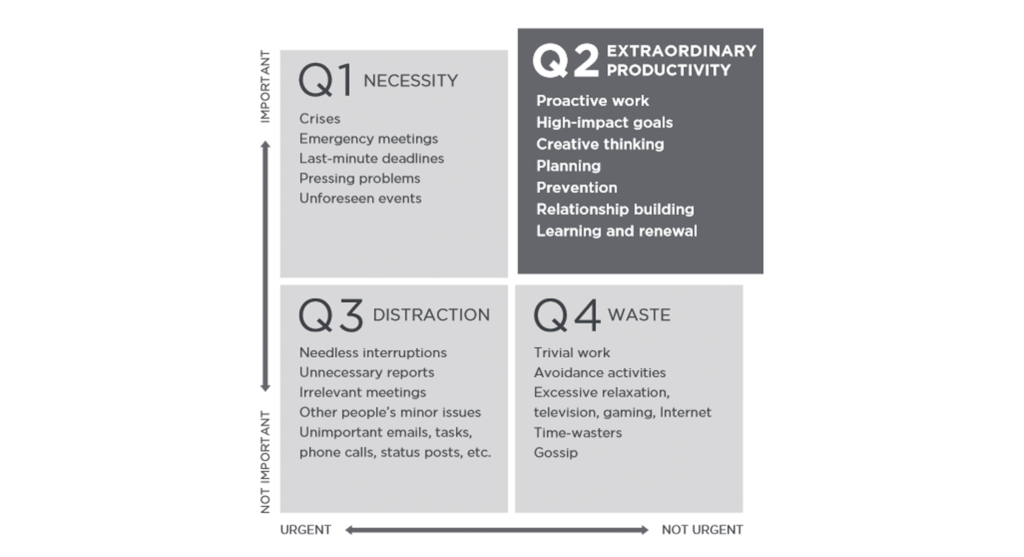The Pareto Principle or 80:20 rule says that 80% of your results comes from only 20% of your efforts. So do we eliminate what’s not working, and bring more fulfilment and success into our lives and work.
As a creative strategist and marketing professional, one of the most common challenges I see small businesses and entrepreneurs face is finding the time to work on their business, as well as in their business.
What’s the difference?
Working in your business means serving customers or clients, making or sourcing products, ordering and distribution, administration and management, and the like. While working on your business is more about strategic planning, goal setting, relationship management, marketing, building a mailing list, and evaluating how you are going – all of which directly impact your growth and success.
It’s understandable when you run a one or two person show that the important, but non-urgent stuff – think quadrant 2 for the Stephen Covey fans – gets left to the end of a very long list of Things To Do (TTDs).
In Stephen Covey’s book, The 7 Habits of Highly Effective People, quadrant 2 refers to the not-urgent / important stuff people need to do in life or business, that often gets pushed back or deprioritised because of quadrants 1 (urgent / important stuff), 3 (urgent / not important stuff) and 4 (not urgent / not important stuff) – see table.

Quadrant 2 or the quadrant of ‘extraordinary productivity’ includes all the aspects that will support you in being proactive, focused, and creative in your life and business goals, and will allow you to engage in continual reflection and growth.
What happens when you don’t focus on the quadrant 2 stuff? Well, you probably aren’t being as strategic and intentional as you could be, and you might spend a whole lot of time doing things that are not really contributing to your goals. In fact, the stuff you are focusing on might be creating blocks and distractions that get in the way of what you are hoping to achieve.
One of the seven habits that Covey suggests cultivating is Habit 3 – Putting first things first – which means ‘organising and executing around your most important priorities. It’s about ‘living and being driven by the principles you value most, not by the agendas and forces surrounding you’.
It’s what Greg McKeown calls ‘essentialism’ – eliminating the non-essential stuff in order to focus on what’s essential (more important) and what’s going to get you closer to your goals.
How do you eliminate the nonessential stuff?
In his book, The Four Hour Work Week, Tim Ferriss talks about the Pareto Principle or 80:20 rule, which states roughly 80% of effects or outputs come from 20% of causes or inputs.
For example:
- 80% of your results come from 20% of your time spent (effort) or business strategies
- 80% of your income comes from about 20% of your sales
- 20% of your clients deliver 80% of your income
It also means that 80% of your energy and effort is likely to be only contributing around 20% towards achieving your goals.
Tim says to reduce the amount of unnecessary and ineffective stuff (i.e. to knock out some of the TTDs in quadrants 3 and 4 and carve out more time for quadrant 2) find the 20% of things you do that have the greatest impact on achieving your goals.
In your work or business you can ask yourself:
- what tasks (email, work for others,etc) am I doing that aren’t meeting my priorities?
- what percentage of my day is spent on strategic, focused work?
- have I identified the activities that have the greatest impact / success in my work or business?
- what strategies are attracting the most clients or sales?
- what products or services are selling the most?
- what blog posts, social media posts or marketing activities are attracting the highest engagement or bring in the most leads?
- which clients are coming back and why? (If you don’t know, ask them!)
In your personal life you can explore:
- what are the big distractors and time-wasters in my life that get in the way of achieving my goals?
- what am I doing for other people that I don’t want to do?
- what percentage of my time each week is spent on the people and stuff I say is the most important to me?
- what areas of my life (e.g. family and relationships, health and wellbeing, spiritual, work, financial, etc) are really firing / working well right now and why?
- what practices or habits have I cultivated (e.g. exercise, meditation, diet, creativity, etc) that are contributing to my life / which ones aren’t?
When you discover the answers to these and your own questions, you can begin to identify what’s effective, what contributes to your goals, and what brings joy and fulfilment, versus all the stuff that sucks your time, weighs you down, and distracts you from what is most important to you.
You can stop wasting 80% of your efforts for only 20% of your results, and focus your time and attention on the 20% that works.
Annette Loughlin-Smith is a writer, Reiki teacher and creative strategist. This article was originally published in The Women’s Pic. Photo by Diana Agapova.







0 Comments